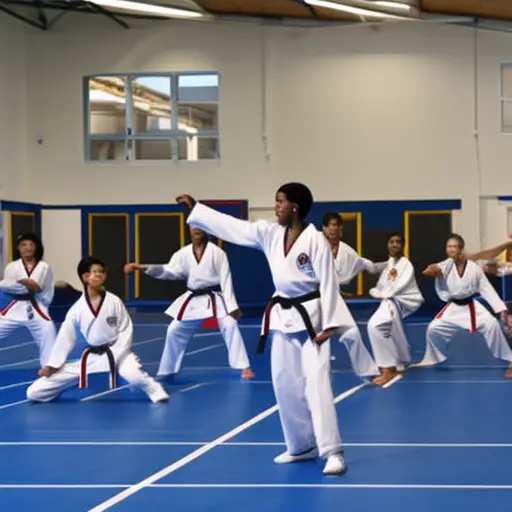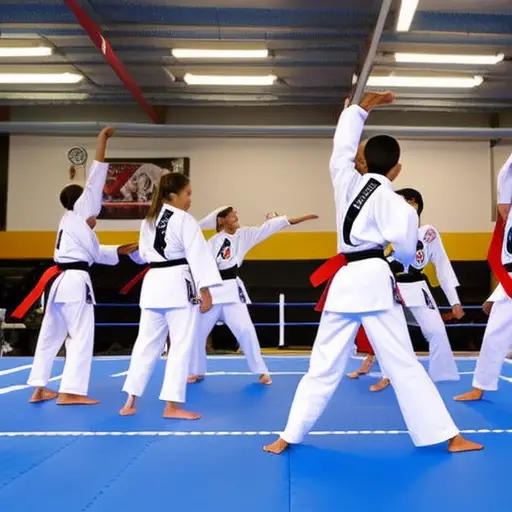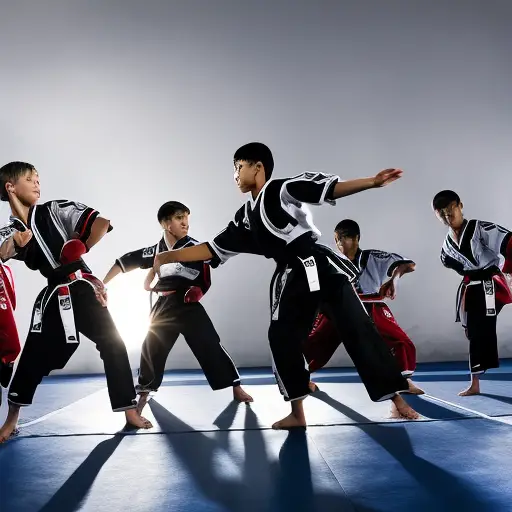The Role of Taekwondo in Children’s Holistic Development
Did you know that participating in taekwondo can have a profound impact on a child’s overall development? According to recent studies, engaging in this martial art can contribute to physical fitness and health, emotional well-being, cognitive development, self-confidence, and character building.
In this article, we will explore the various ways in which taekwondo plays a crucial role in children’s holistic development, providing them with valuable life skills and a strong foundation for success.
Physical Fitness and Health Benefits
In the realm of physical fitness and health benefits, Taekwondo plays a pivotal role in enhancing children’s overall well-being and promoting a healthy lifestyle. Taekwondo is a martial art that focuses on the development of various physical attributes, including increased flexibility and coordination, as well as improved cardiovascular endurance and muscle strength.
One of the key benefits of practicing Taekwondo is the development of increased flexibility and coordination. Through a combination of stretching exercises and precise movements, practitioners of Taekwondo gradually improve their range of motion and ability to control their body movements. This not only enhances their physical performance in Taekwondo techniques but also translates into improved flexibility and coordination in daily activities.
Additionally, Taekwondo is renowned for its ability to improve cardiovascular endurance and muscle strength. The high-intensity nature of Taekwondo training requires practitioners to engage in rigorous physical activities such as kicking, punching, and sparring. These activities not only elevate heart rate and promote cardiovascular health but also contribute to the development of lean muscle mass and overall muscular strength.
Emotional Well-being and Stress Management
Taekwondo training provides a comprehensive approach to emotional well-being and stress management, allowing children to develop resilience and coping strategies. Through the practice of taekwondo, children learn to regulate their emotions, build emotional resilience, and develop effective coping skills. Here are four ways in which taekwondo contributes to emotional well-being and stress management:
-
Emotional Regulation: Taekwondo training teaches children to recognize and manage their emotions. By focusing on breathing techniques and meditation, children learn to calm their minds and control their emotions, enabling them to better handle stressful situations.
-
Self-Confidence: Taekwondo promotes self-confidence and self-esteem in children. As they master new skills and techniques, they gain a sense of accomplishment, which boosts their self-confidence and helps them overcome challenges both on and off the training mat.
-
Stress Reduction: Engaging in physical activity through taekwondo helps reduce stress levels. Regular exercise releases endorphins, also known as ‘feel-good’ hormones, which elevate mood and alleviate stress. Taekwondo provides a healthy outlet for children to release tension and pent-up emotions.
-
Problem-Solving Skills: Taekwondo training involves learning patterns and techniques that require strategic thinking and problem-solving. Children learn to analyze situations, make quick decisions, and adapt to changing circumstances, enhancing their problem-solving skills and enabling them to better manage stressful situations.
Cognitive Development and Concentration
A key aspect of children’s holistic development lies in their enhanced cognitive abilities and improved concentration, which can be fostered through the practice of taekwondo. Taekwondo is not just a physical martial art; it also has numerous cognitive benefits that contribute to a child’s overall development.
One of the cognitive benefits of taekwondo is memory improvement. Through the repetition of techniques and forms, children are required to remember and execute a sequence of movements. This constant practice helps to enhance their working memory, which is crucial for learning and retaining information in various aspects of their lives.
Additionally, taekwondo helps develop problem-solving skills. During sparring sessions or demonstrations, children need to analyze their opponent’s movements and come up with strategies to overcome them. This process requires critical thinking, quick decision-making, and adaptability. By regularly engaging in such activities, children improve their problem-solving abilities, which can be transferable to other areas of their lives, such as academics or social situations.
Furthermore, the practice of taekwondo requires a high level of concentration. Children learn to focus their attention on their movements, their breathing, and their surroundings. This ability to concentrate on the present moment not only improves their performance in taekwondo but also helps them develop better focus and attention span in other areas of their lives, such as studying or completing tasks.
Building Self-confidence and Self-esteem
Moreover, regular participation in taekwondo classes and the achievement of specific milestones can significantly enhance children’s self-confidence and self-esteem. Taekwondo is a martial art that focuses not only on physical skills but also on mental and emotional development. Through the practice of taekwondo, children learn to build resilience and overcome challenges, which in turn strengthens their self-confidence and self-esteem.
Here are four ways in which taekwondo helps in building self-confidence and self-esteem:
-
Setting and achieving goals: Taekwondo provides a structured environment where children can set specific goals for themselves, such as earning a new belt rank or mastering a new technique. As they work towards these goals and see their progress, they gain a sense of accomplishment and confidence in their abilities.
-
Positive reinforcement: Taekwondo instructors use positive reinforcement to encourage and motivate children. They provide praise and recognition for their efforts and improvements, which boosts their self-esteem and encourages them to continue working hard.
-
Facing and overcoming challenges: In taekwondo, children are constantly faced with new challenges, whether it’s learning a difficult technique or competing in a tournament. By facing these challenges head-on and persevering, children develop resilience and gain confidence in their ability to overcome obstacles.
-
Supportive and inclusive community: Taekwondo classes provide a supportive and inclusive community where children can feel accepted and valued. They develop positive relationships with their instructors and fellow students, which helps to boost their self-confidence and self-esteem.
Character Development and Discipline
Developing character and discipline are essential aspects of a child’s holistic development, as they foster personal growth and cultivate a strong sense of responsibility. Taekwondo, with its emphasis on self-control and perseverance, plays a crucial role in shaping these qualities in children.
Self-control is a fundamental attribute that children learn through practicing Taekwondo. By teaching them to regulate their actions and emotions, Taekwondo helps children develop the ability to make thoughtful decisions and resist impulsive behavior. This skill extends beyond the training mat and becomes an integral part of their daily lives, enabling them to handle challenging situations with composure and maturity.
Alongside self-control, perseverance is another key trait that Taekwondo instills in children. Through the rigorous training and demanding physical exercises, Taekwondo teaches children the importance of perseverance and the value of hard work. The ability to persist through challenges, setbacks, and failures not only enhances their physical capabilities but also cultivates mental resilience and determination.
Moreover, the discipline fostered by Taekwondo extends beyond physical training. It encompasses respect for oneself and others, adherence to rules and regulations, and a strong work ethic. This discipline helps children develop a sense of responsibility and accountability, teaching them the importance of commitment and dedication in achieving their goals.
Frequently Asked Questions
How Long Does It Typically Take for a Child to See Improvements in Their Physical Fitness and Health Through Practicing Taekwondo?
Typically, children can start seeing improvements in their physical fitness and health within a few months of practicing taekwondo. However, the timeframe for improvement may vary depending on factors such as the child’s age, commitment, and individual abilities.
Can Taekwondo Help Children With Anxiety and Depression in Addition to Managing Stress?
Taekwondo has been found to have a positive impact on children’s mental well-being, including helping with anxiety and depression, as well as building emotional resilience. It provides a structured environment for stress management and promotes self-confidence.
What Specific Cognitive Skills Can Children Develop Through Taekwondo Practice?
Through taekwondo practice, children can develop various cognitive skills such as improved mental focus, attention, and concentration. This martial art requires students to engage their minds, enhancing their cognitive development and overall mental abilities.
Are There Any Specific Techniques or Exercises in Taekwondo That Focus on Building Self-Confidence and Self-Esteem?
Building self-confidence and self-esteem are essential elements of taekwondo training. Through specific techniques and exercises, such as forms, sparring, and breaking boards, children can develop a sense of accomplishment, resilience, and belief in their abilities.
How Does Taekwondo Contribute to the Development of Discipline and Character in Children?
Taekwondo plays a significant role in fostering discipline and character development in children. Through its rigorous training methods and emphasis on respect, perseverance, and self-control, taekwondo instills valuable life skills that contribute to a well-rounded individual.
Conclusion
In conclusion, Taekwondo plays a significant role in children’s holistic development.
It promotes physical fitness, emotional well-being, cognitive development, self-confidence, and character building.
Through its rigorous training, children not only improve their physical strength but also learn to manage stress and enhance their concentration skills.
Moreover, Taekwondo instills discipline, self-esteem, and a sense of responsibility in children.
Overall, Taekwondo is a powerful tool that molds children into well-rounded individuals, empowering them to reach their full potential and achieve greatness in all aspects of life.





